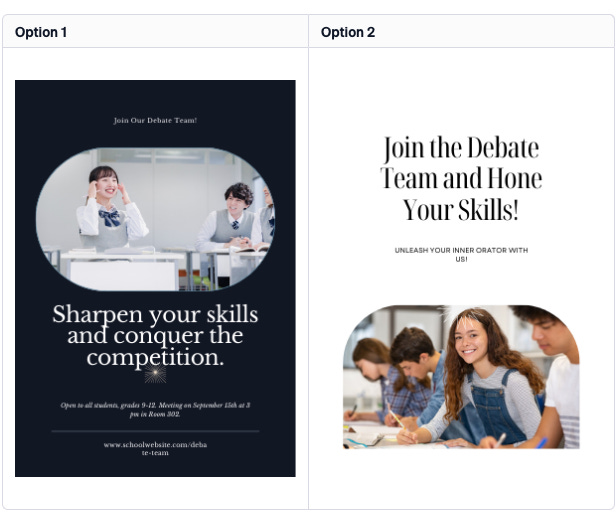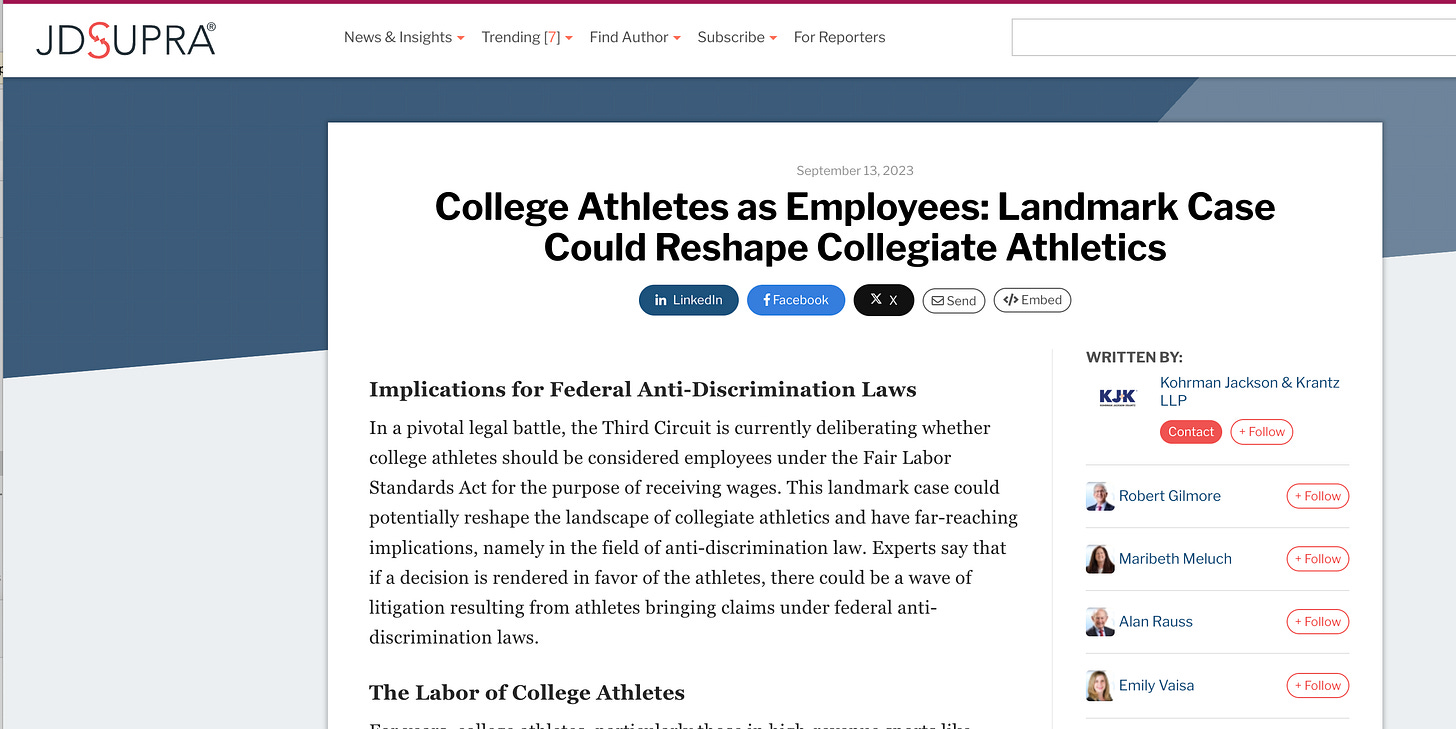How 6X'd+ my Productivity with AI this Weekend (15+ hours of work in 2:30)
And I did more and better work than I otherwise would have.
TLDR
*Debate recruiting posters with ChatGPT4 and Canva in less than a half hour (30 minutes; 30 minutes saved)
*12-page essay on a new debate topic with Perplexity.ai, Consensus, and Google Scholar with human editing and strong sources (90 minutes; 10.5 hours saved).
*Converting the 12-page essay into a 7-minute podcast script with ChatGPT (6 minutes; 1 hour saved)
*Production of a podcast with Synthesia.io (5 minutes). New product produced
*Conversion of Scripts to PowerPoints (5 minutes (a little cheating here that I’ll explain below)). (1 hour saved)
*Conclusion: Better product, less time; less learning; reverse grammar and spelling incentives; I can do better.
#1 Poster
You can see my simple prompt here on the main screen of ChatGP4 — “please make me a recruiting poster for my high school debate team.”
ChatGPT then “expanded my prompt” with no additional action by me.
It then made me a poster.
Yes, there are spelling errors; this is still a weakness of ChatGPT image generation.
So, I uploaded it into Canva and used their AI tool to extract the words from the image
And I fixed the spelling.
Then I used their AI tool to translate it into Spanish.
But then I told ChatGPT to use my @Canva assistant to do the same thing from the same ChatGPT4 home page.
BOOM!
It even gives me two options.
These aren’t as nice as the above, but I can click on either one and go directly into Canva to edit further.
I was able to do something in 2 minutes that would take me 30–60 minutes (some Canva users could do it faster without GPT4, but now anyone can easily use it).
#2 Essay on the debate topic
There is a new debate topic on paying student athletes. I normally write an essay or argument overview for my debaters. Friday night, I used Perplexity Pro.
I started with a basic prompt to ask it to write some basic background material..
I gave it a follow-up.
And since it's a “semantic search,” it’s always trying to understand what you are asking about.
The “footnotes” had many good sources.
Wow. It wrote about the first thing I asked about (a basic intro) and then kept asking relevant follow-up questions (I already knew a bit about the topic, so I knew they were relevant), and it produced very good explanations with links to sources that were all legit (respectable, some scholarly, factually accurate, zero hallucinations) on all related issues.
And what I think is most helpful to students is that it suggests guided follow-up questions on related issues.
Saturday evening, I spent an hour
(a) reorganizing the order of the content;
(b) adding in some additional explanation from me;
(c) asking Claude to rephrase a few things (I think Claude is a better writer);
(d) using @Consensus on ChatGPT4 to get a few more sources;
(e) using Google Scholar to add a few more sources.
Basically, I did something in 90 minutes that would normally take me a day.
12-page topic overview essay done.
Oh, and I did a general Google search to see if it might be missing some key sources.
Google returned a trash can of links, mostly promotional links to companies or shitty advocacy pieces. And then the awful pro-con lists.
#3
I converted the 12-page essay into a 7-minute podcast script with ChatGPT4 in 6 minutes.
#4
I created a production of a podcast with Synthes.io (5 minutes). Quick, 8-minute podcast on the topic for the debaters is done.
#5
I asked two friends who have Microsoft Copilot to generate a PowerPoint with the script I generated from #3. They didn’t have to do anything except ask Power Point to make a Power Point from the script.
#6
I used a lot of Grammarly for proofreading and (re)writing suggestions.
I still have to edit these (I’ll pick one and spend 20 minutes), but this quick start saved me at least an hour.
Lessons Learned.
Better work, faster. In all instances, I did better work than I otherwise could have (flyer) or that I had time to do (debate topic essay that I couldn’t have spent that much time on). And in the case of the essay, I probably ended up with better sources thanks to Perplexity’s semantic search. The momentum for that is growing (many others are switching from Google, and hopefully the basic Google search will either disappear or no longer be taught in schools).
Additional products. The podcast is a new product, and I’ll do even better soon with HeyGen by generating it from my own image and voice and translating it to other languages.
What does this mean for students? Well, students who are writing papers using general research resources (think grades 9–13, 100-level courses in college) will access better research resources than those conducting a basic scholarly search. 200-400 level courses+ some grad school will also get resources of that quality level and can do so with some direction. The research foundations of their paper will be stronger. They’ll certainly produce better products.
Will they think more or less than if they try to swim through the paid links in a Google search? They’ll probably learn less, but if they don’t read the links in the Perplexity results, they’ll probably learn less about their topic and think less because they aren’t thinking through the construction of the paper.
But what does this really mean? It means a research paper is a poor demonstration of content knowledge, and we need to use other tools (debate, PBL, simulations, etc.) to develop these skills and teach the content. But when preparing, they should use Perplexity’s semantic search. Everyone needs to learn how to be a researcher.
A bit of laziness. I didn’t worry about grammar and spelling at all when I typed because I knew I could just click through on Grammarly and fix it. Maybe that’s the new world. Maybe that’s not the best.
AI empowered me. AI made me better. We, and our students, can choose to use AI to make us better, or, in many cases, we can choose to let it at least largely do our work. But if we, and our students, do that, we have no value, as AI won’t need us to get it to do its work for much longer.
I can do better. The better I get at using these tools, the better work I will do and the more productive I will be.
















